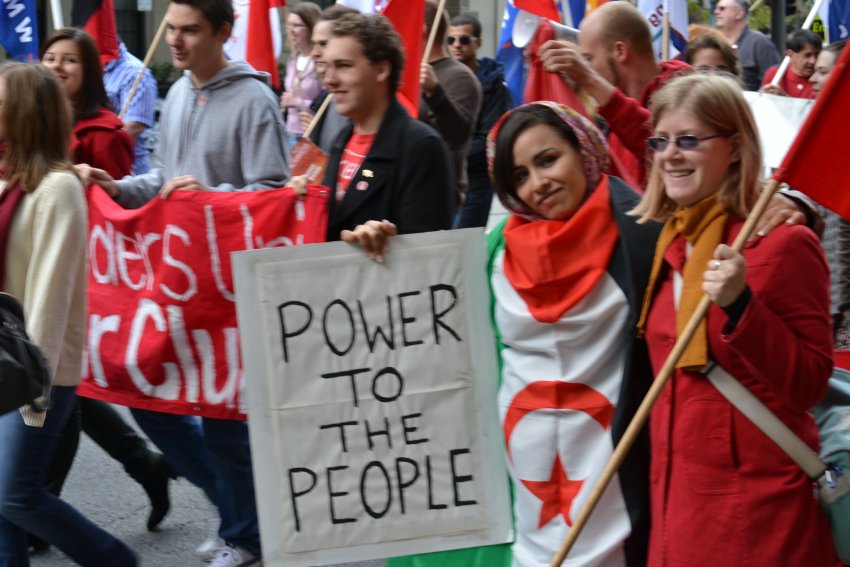
Western Saharan human rights campaigner Malak Amidane is touring Australia in May to raise awareness of the brutal occupation of her homeland.
Amidane and her family live in Laayoune, the capital of Moroccan-occupied Western Sahara. In recent years, Moroccan security forces have targeted the Amidane family for speaking out against the illegal military occupation. Amidane herself has been beaten, imprisoned and tortured by Moroccan police. Since 2006 she has campaigned for greater international support for Western Sahara in Spain and France.
Green Left Weekly’s Ryan Mallett-Outtrim spoke to Amidane about the ongoing crisis in Western Sahara.
* * *
Can you tell me what it’s like for Sahrawi living under the occupation?
All the Sahrawi people suffer. But, for my family, many are in prison and many are in refugee camps.
I have a brother who was imprisoned two times. The first time was for two years, the second for five. He went to the jail at 18 and was released when he was 25 years old. It’s so hard, because he lost his [ability to] study and now he has health problems.
My sister too: she’s a human rights defender but she can’t go back home. My mum is alone now. There is a police car outside the house 24 hours a day. It’s a horrible situation.
You have an injury to your eye. It is being treated in Spain because you cannot have the surgery in Western Sahara, right?
Yeah, it’s an old injury from 2006. I was beaten in a demonstration. It was very bloody. I couldn’t go to the hospital because the police were there.
During demonstrations, if anyone goes to the hospital the police are there and they take them directly to the police station. We were scared, so we just put natural remedies on [the injury]. But, that has [caused] problems with my [eye]. I couldn’t see so well, so I go to Spain to have surgery and now next month I have [more] surgery too.
How many times have you been beaten by police?
I [don’t] know, too many times. My family house was also set on fire. Moroccan citizens came with the police and they were looking for me. They were looking for my papers, so they set fire to everything. My family escaped and stayed with friends. You know, I am so lucky to be here — to be able to talk when many cannot.
You have been in Australia for about a week now. Could you compare the support movement for Western Sahara here to Spain and France?
In France it’s zero ... there is nothing. In Spain, the government is bad ... they promise us many things but don’t do anything. But the Spanish people are helping. They are trying to do what the government cannot. They go to the camps, they send humanitarian aid and they bring children from the camps for holidays. They go to the occupied territories to see what has happened to us.
As for the Australian people, there are few people that know about the case [of Western Sahara], but they are working hard to open the eyes of other Australians.
Video: Interview with Malak Amidane - YouTube/ArneCar.
Why is it important that Australians care about Western Sahara?
Australia is a country that steals a lot of Western Sahara’s phosphate. We suffer a lot in my country because of this. We are so poor, we have nothing.
When I came to Australia, I came to speak to the Australian people, to pressure the Australian government to stop these companies that steal our natural resources. We need your support to be free.
What is the hardest thing about getting support here in Australia?
I think the Australian people are a good people, but they don’t know anything about many countries like Western Sahara.
Do you hope that more Sahrawi will visit Australia?
Yes, but what I hope more is to see Australians visit my country to see what is really happening [and] to visit us as friends.
Is there any alternative to self-determination for the people of Western Sahara?
I think the most important thing now is to get free. We don’t need more time. We [Sahrawi] have a president, we have a parliament, a flag. We have everything: we just need our country. I think [after independence] we will have problems. But these problems will not be bigger than the occupation.
It has been 37 years since the International Court of Justice advised self-determination for Western Sahara. This conflict has been going since long before you were born. Realistically, what are the chances it will be resolved any time soon? Is there any hope?
Look, the problem is that we are so few. And [that] we do not just have one enemy, we have many — Morocco, France, Spain and the United States. So, things are going slowly. But we are going one step at a time.
One day we will [be] free, but we need a lot of help. I am here to talk to the Australian people — wherever we go, we talk to the people. People can do what governments cannot.
[Amidane will speak in Sydney on May 17. For details of events in other cities email awsa.victoria@gmail.com]
Comments
Anonymous replied on Permalink
Anonymous replied on Permalink